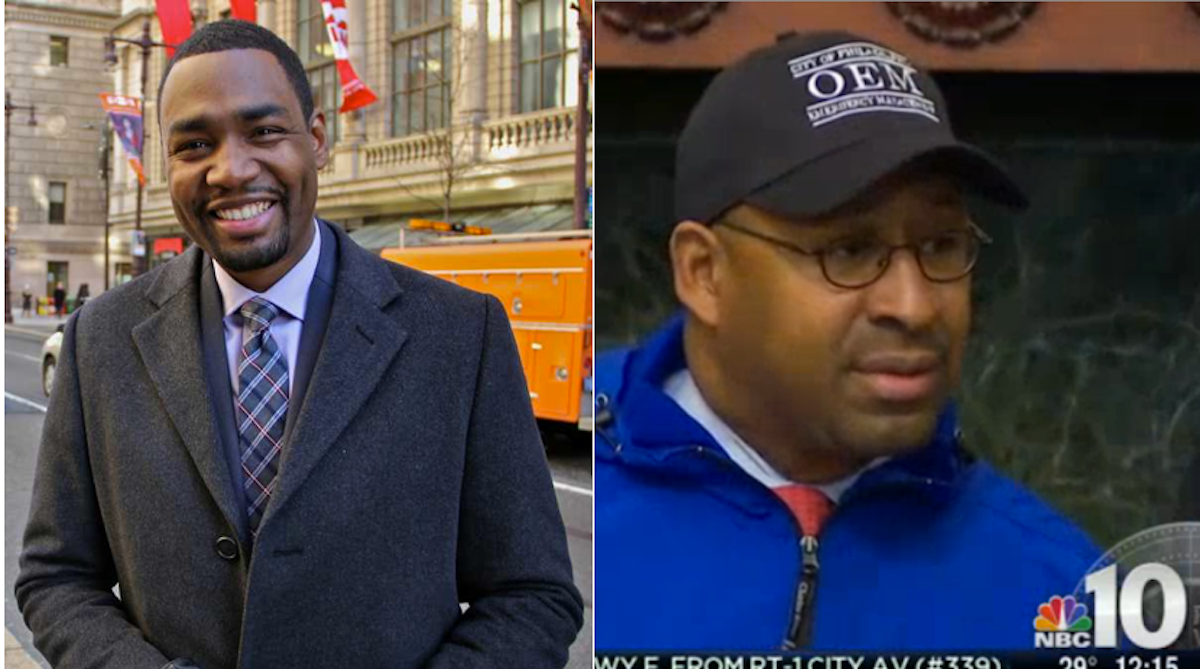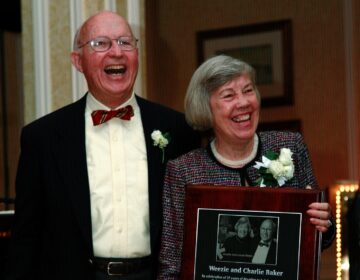Doug Oliver lifts the veil on City Hall’s winter storm-prep messaging

As Mayor Michael Nutter's former spokesman, mayoral candidate Doug Oliver (left) has some insight into behind-the-scenes snowstorm preparations. (NewsWorks file art, NBC10 screengrab via Billy Penn)
As many Philadelphians exercised Monday’s early-workplace parole as “Juno” closed in, NinetyNine caught up with mayoral candidate Doug Oliver at the La Colombe location within eyeshot of City Hall.
There, he discussed why he chose Germantown for his formal Feb. 7 campaign launch; that story will post in the coming days.
More pressingly, the former spokesman for Mayor Michael Nutter and Philadelphia Gas Works was asked to hearken back to the days of arranging pressers like the one in which Nutter declared a “snow emergency” in the city.
The preparation side of things
The first order of business, he said, is “making sure the city is prepared for it.”
“You’re on the phone all day with the Streets Commissioner, making sure you’re aware of where the prep work is,” he said of the press-office responsibilities. “Are we salting? Are we brining? First of all, you don’t even know what brine solution is until somebody tells you it’s some probably toxic mix of chemicals that keep the roads from icing over. You learn about terms like ‘deep-packed snow.'”
This is done in order to make sure the mayor has all information at the ready before the cameras light up.
From there, the task becomes making sure all involved agencies are up-to-speed on what’s going on with the others. That includes people clearing streets, those involved with the city’s schools and state agencies like PennDOT.
“By the time the mayor’s in the room [you have to be up to speed because] it becomes ‘All right, tell me what’s going on,'” he recalled. “The Streets Commissioner will then have the run down. ‘Ok, we’re going to have 250 trucks on the streets from 6 a.m. til whenever, or ‘we’re salting the night before’ or ‘we’re doing this and we expect to have the streets clear by then.'”
It’s a role that City Hall’s media liasions grow into.
“I never saw any sort of checklist,” he said. “If there was an emergency to the extent that you needed to tell people to stay off the roads, then you want the mayor to deliver that message. From a press perspective, we just wanted to make sure we are part of all those conversations.”
The fringe political benefits
Aside from the ensuring-safety perspective of the regular press briefings, these situations offer a chance to humanize elected officials.
“It’s a great opportunity for exposure for any mayor,” Oliver said. “‘Mr. Mayor, you’re going to be at the Salvation Army at 9 a.m. Then, you’re going to be helping Miss Jenkins shovel out her driveway and we’ll conveniently let the press know where you’re going to be so they can capture you while you’re shoveling.’
“You check in on the homeless shelters, to make sure we’re taking care of our most vulnerable, encouraging people to check in on their grandparents. You try to use it as an opportunity to bring out the best in Philadelphians. That’s the good side of the snow.”
For his part, however, Oliver hated the snow events. While the mayor had a driver to get him to the events that Oliver organized, the spokesman was on his own to get there.
“They were really exciting times,” he said, noting that TV hype doesn’t particularly make it more difficult to do the job.
The inundation of attention was a double-edged sword.
It’s frustrating when the hype is all wrong (thus closing schools when they needn’t be), but he said, “If nobody cared about the weather, why would people want the mayor to come on TV and talk about it?”
WHYY is your source for fact-based, in-depth journalism and information. As a nonprofit organization, we rely on financial support from readers like you. Please give today.




